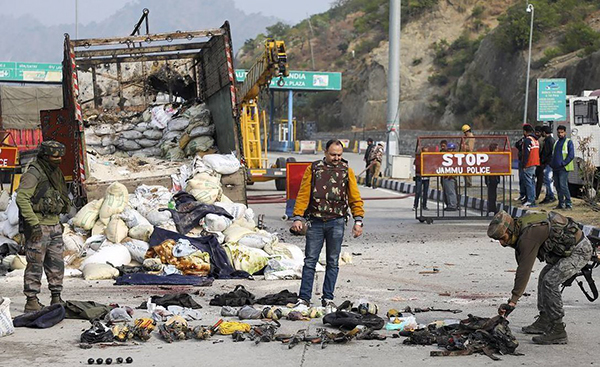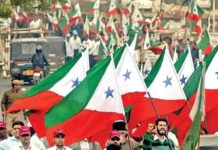
Major Infiltration Bid Foiled; India Launches Multi-pronged Diplomatic Offensive
In a major accomplishment for the security forces, four Pakistan-based terrorists belonging to Jaish-e-Mohammed (JeM), were wiped out in an encounter near NagrotaBan Toll Plaza in Jammu & Kashmir on 19 November. The terrorists were trying to reach Srinagar in a truck. One police constable was injured in the encounter.
According to the J&K Police, the terrorists crossed the International Border in Jammu and were met by a courier in a truck at a pre-designated spot on the national highway south of Samba. The truck was supposed to ferry them to Kashmir but was stopped at the Ban toll naka in Jammu, based on specific inputs generated by intelligence agencies. When the police tried to check the truck, the terrorists opened fire, leading to two injuries among the policemen. In the gunfight that followed, all four terrorists were killed.
The 19 November encounter was a huge setback for the terror group, given how heavily Asghar had invested in their training and infiltration.
Tunnel Used to Infiltrate
Border Security Force said professional engineering expertise had gone into digging the 200-metre tunnel under the border fence the tunnel in Pakistan’s Shakargarh area was a surprise. What surprised investigators was the engineering detail that went into construction of the tunnel used by the Nagrota attackers to reach the pick-up point at Jatwal, 12 km from the international border. The tunnel, probably constructed with the help of Pakistani Rangers, was 200 metres long with enough space for terrorists to walk upright and cross the border. The tunnel was 40 metres long on the Pakistani side.
ALSO READ: Indian Army’s Response to Pak Terror Attacks in 2020
The terrorists had been receiving their orders the top commanders of the terror outfit, Mufti Rauf Asghar and QariZarar. Asghar is the younger brother of UN designated global terrorist Masood Azhar who leads the terror group.
Smartphones manufactured by Q Mobile, a Pakistani company recovered from the killed terrorists revealed that they had been receiving updates and messages from their handler in Pakistan.
J&K Police investigations have revealed that the Jaish terrorists had been sent with the specific task of carrying out a large attack ahead of the District Development Council (DDC) polls to derail the entire election process.
Police recovered 11 AK assault rifles, 24 magazines and 7.5 kg of RDX along with 20 m of IED wire and six detonators. Recoveries include one Under Barrel Grenade Launcher (UBGL), 29 grenades, five rifle grenades, three pistols with six magazines, a wireless set and a GPS. The four were also carrying 6.5 kilograms of nitrocellulose mixed with fuel oil, an explosive used in shaped charges.
Medicines recovered from the terrorists include painkillers, antibiotics to fight diarrhoea, Unani medicines, injections and surgical gauze. They have all been manufactured by Pakistani companies such as Lahore Medical Instruments Pvt Ltd (Kasur), Qarshi Industries (Khyber Pakhtunkhwa), Sami Pharmaceuticals (Karachi), Rehman Rainbow Pvt Ltd (Lahore) and Sanofi-Aventis Pakistan Ltd (Karachi).
Since August 2019, over 200 terrorists have been gunned down, including over 30 foreigners, in intelligence-driven precise operations by security forces in Jammu & Kashmir.
Terrorists Facing Problems
Mufti Rauf Asghar, Jaish-e-Mohammed (JeM) operational commander, who had coordinated the infiltration of the heavily-armed operatives into India told Jaish terrorists in Kashmir that it was becoming difficult to supply them the necessary “items”, a reference to explosives and weapons. Asghar sent the message soon after the gun battle at Ban toll plaza.
Mufti Asghar is the younger brother of JeMchief and UN designated global terrorist Masood Azhar who is reported to have been under treatment for a life-threatening spine aliment. Asghar is considered the terror group’s de facto chief in his elder brother’s absence and had overseen the infiltration of the four terrorists from Bahawalpur in Pakistan’s Punjab province.
ALSO READ: Digital Footprint of Terrorism in Kashmir
Investigations into the encounter revealed the involvement of JeM operational commander Kasim Jan, the principal accused in the 2016 Pathankot air base attack. Jan is one of the main launch commanders of Jaish terrorists into India and has links with underground workers all over South Kashmir. He reports directly to Mufti Rauf Asghar, the de-facto chief of the UN designated global terrorist group.
According to intelligence reports, terrorist group Lashkar-e-Taiba (LeT) is also mobilising cadres from its Chelabandi camp in Muzaffarabad to fresh locations in Neelum Valley across the Line of Control (LoC) between India and Pakistan. And the Hizbul Mujahideen training nearly 400 cadres at a newly constructed facility in the forest area of Oghi in Khyber-Pakhtunkhwa (KPK).
The Jaish, intelligence reports indicate, is not the only one feeling the heat. According to one input, the Al Badr group is exploring ways to infiltrate into India from Bangladesh after security forces tightened the security grid across the LoC in Kashmir.
Pakistan Under Pressure
Indian intelligence officials suspect the attempt to carry out terror strikes at high-value targets could be a diversionary tactic by the Pakistani army and ISI chiefs, under pressure from Opposition parties in the country, to bring the focus back on Kashmir.
With the withdrawal of US forces from Afghanistan and resurgence of the Taliban, its Deobandi ideological brother Jaish has got hyperactive across the Jammu & Kashmir border with no less than 14 specially trained terrorists waiting at Gujaranwala to infiltrate into India.
“Nearly 200 terrorists of mixed tanzeems are waiting at launch pads across the Line of Control (LoC) to infiltrate into India. We are picking up revival of Al-Badr group as well as creation of another terror front Lashkar-e-Mustafa, headed by one Hidyatullah Malik, and other Pakistani based Lashkar-e-Taiba (LeT) group training another 23 terrorists at Jangal-Mangal camp in Khyber-Paktunkhwa,” said another security official.
Pakistan-based terrorist groups have become especially active after the US withdrawal from Afghanistan and have been preparing for a major drive in Jammu and Kashmir, according to intelligence reports. The Al Badr group is exploring ways to infiltrate into India from Bangladesh after security forces have turned the heat on infiltration across LoC in Kashmir.
Diplomatic Offensive
Soon after the Nagrota encounter of 19 November, prime minister Narendra Modi held a review meeting with home minister Amit Shah, national security advisor (NSA) AjitDoval, foreign secretary Harsh Vardhan Shringla and top intelligence establishment. It had been found that the terrorists were planning a “major attack” on the anniversary of the 26/11 terror attack. It was decided to step up its diplomatic campaign to hold Pakistan accountable.
The ministry of external affairs (MEA) summoned an official of the Pakistan high commission in Delhi over the encounter, on 21 November, and conveyed India’s strong concern to Pakistan over terror attack planned by JeM in J&K. A protest was lodged demanding Pakistan stops supporting terrorists operating from their territory.
Diplomats Briefed
Foreign secretary Harsh Vardhan Shringla informed a select group of Heads of Missions on 23 November about the discovery of a cross-border tunnel that was allegedly used by the militants to reach the Indian territory. They were provided with a detailed information docket giving the details of the incident as it transpired as well as a list of items and munition that were recovered from the terrorists clearly indicating their Pakistani origins.
Shringla said the attackers were clearly planning the biggest terror attack in India since the Pulwama strike in February 14, 2019. The diplomats were told that the attack appeared to be part of efforts to sabotage the DDC elections in Jammu & Kashmir and was designed to “coincide with the anniversary of 26/11 Mumbai terror strikes”.
ALSO READ: Will Pakistan Escape FATF’s Black-listing?
The Indian side highlighted the secret tunnel unearthed beneath the International Border in Jammu’s Samba Sector on Sunday and said the four militants who were killed in the encounter on November 19 used the tunnel to carry out their plans.
Shringla briefed the envoys about the past attacks by the Jaish-e-Mohammad in Jammu and Kashmir, saying that “…in the year 2020 itself we have seen 200 incidents of terrorist violence and neutralisation of 199 terrorists”.
The briefing was the first in a new series of interaction with foreign diplomats which will consist of small groups in view of the COVID-19 concerns.
Multi-pronged Strategy
Indian missions were also instructed to pass on details of the “information docket” handed over, which included details of the encounter in Nagrota between the suspected terrorists hiding in a truck and security forces, as well as the AK-47 rifles, 29 grenades and 7.5 kg of RDX explosive material the men allegedly had. That this was no ordinary encounter was evidenced from the prime minister’s statement, calling it a “nefarious attempt to target grassroots level democratic exercises in Jammu and Kashmir”, a reference to the District Development Council elections due to start on November 28.
By apprising the international community, it would seem the government has a multi-pronged strategy. The first imperative is to ensure that the full implications of the aborted attack and what could have occurred are understood worldwide, and the threat India continues to face from cross-border terror is acknowledged. In addition, any actions India takes against terror threats the Army perceives along the LoC this point on will be considered retaliatory. The second is to put Pakistan, which has itself been making allegations about a terror threat from India, squarely on notice. Pakistan still faces the final FATF decision in February 2021 on whether it will be blacklisted for its inability to curb terror financing and to shut down groups such as the JeM and the LeT, and the Imran Khan government would be better positioned in fulfilling the action plan it has been tasked with rather than flashing unsubstantiated dossiers with counter-claims against India.
Eventually, India’s success lies in protecting its borders, as done in Nagrota, and by providing a peaceful and stable environment in J&K so as to restart the much-delayed democratic process there, despite all attempts to derail it.
Vice-President M Venkaiah Naidu has called upon the world community to come together to isolate nations that sponsor terrorism and impose sanctions against them. Observing that no country was safe from terrorism, he said the days of platitude were over and it was time for concrete action.

















